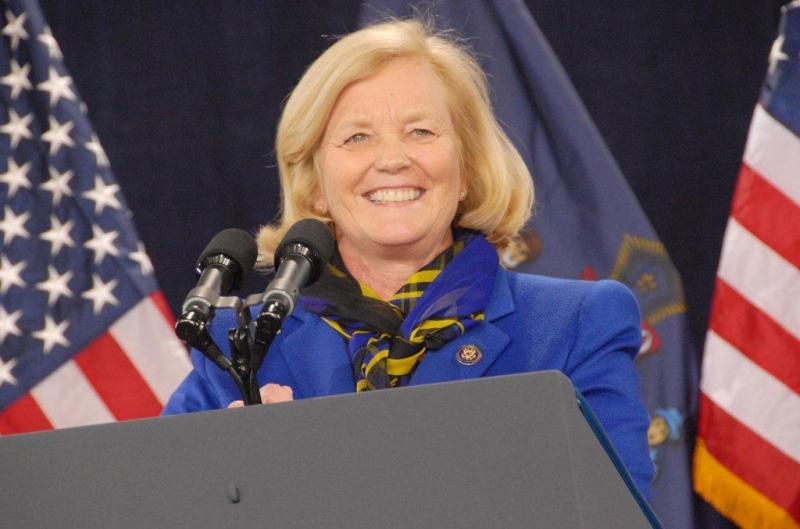Pingree weighs in on critical issues
Chellie Pingree, the Democratic incumbent running in Maine’s first congressional district said she first got involved in politics to work on critical issues like the cost of healthcare, the economy and small businesses.
Since elected into the U.S. House of Representatives in 2009, Pingree said working at the national level has given her a good understanding of how federal issues affect our state.
During a recent interview, Pingree talked about the economic challenges Maine faces, and the opportunities that lie ahead in making healthcare more affordable while capitalizing on alternative energy plans.
Economic issues have really hit our state hard, Pingree said and a lot of her focus at the federal level is how to do more to help the Maine economy.
Pingree said a big issue for Mainers is affording college. With rising tuition costs, and more graduates in deep debt, Pingree said she is committed to keeping in-state tuition costs down, and lowering the cost of federal loans.
Congress is currently fighting over college loans she said, and Paul Ryan’s budget adopted by Republicans intended to cut Pell grants and privatize more of the loan systems in the country. “Pell grants have done a lot, and I don’t want to see any cuts there,” she said.
“In many ways I’m just trying to fight not to lost funding, when I think some of my colleagues think that it’s OK.”
Investing in alternative energy
Since Maine is one of the most oil dependent states in the union, Pingree has been a proponent of all types of renewable energy. She said she understands Maine’s potential to use alternative energy to not only ease our oil dependence, but to create jobs. She said she is supportive of Eastport’s tidal energy project, and the federal grants that are funding tests for offshore wind.
Pingree is a native of North Haven, an island in Penobscot Bay that is home to three 1.5-megawatt wind turbines. During the dedication of the wind project, she said a couple representatives from Statoil company attended the ceremony and there was encouragement about the idea to have a partnership in Maine.
Currently there is four-turbine project being proposed by a Statoil that applied to the federal Bureau of Ocean Energy Management to lease 22-square nautical miles approximately 12 miles off the coast of Boothbay.
Pingree, supporter of the Statoil proposal said, “For all the right reasons Maine has a lot of wind, and deep water so I’m very excited about the possibilities and see the potential for energy independence for jobs.”
Reducing costs and becoming more energy independent is essential to stabilizing the economy according to Pingree, and she said there is universal agreement that the escalating cost of healthcare is a huge burden to small businesses.
Healthcare
Pingree said there are a lot of variables that will factor in once the Affordable Care Act is implemented, but overall she said she believes the government program will not only help Mainers and small businesses, but it will allow for a variety of systems that will offer more options and drive competition in the healthcare market.
“It’s important on many fronts,” Pingree said. “I think there is a role for the federal government to just make sure people can afford preventive care and healthcare costs.”
Pingree said she is concerned about the consolidation of hospitals because of the economic implications it poses on a community.
“Take Boothbay for instance. Your economy is not dependent, but it’s related to the summer visitors, and people suddenly start to say, ‘Maybe I won’t build a house there if I’m not close to healthcare,’” she said. “It’s just a big issue for people, especially in an older state like ours.”
Pingree said the Affordable Care Act will have a positive impact on rural hospitals because there will be more funding available for federally qualified rural health centers and cited the two health centers that have opened up in Sanford and Vinalhaven.
On the issue of federal reimbursements that the government pays to hospitals for Medicare and Medicaid patients, Pingree said it is a huge issue that affects how hospitals run because they depend on the government payments to balance their budgets. One of the constant struggles is how to increase the amount available for reimbursement. The state legislature she said is trying to take more people off of the qualification of Medicaid to reduce costs.
Since Maine in considered one of the oldest aged states in the nation there are a lot of people who qualify for Medicare and Medicaid. Maine also ranks 40th in per capita income in the nation, so resources and insurance coverage are not readily available Pingree said.
“The one thing the Affordable Care Act really changes is it gives, many, many more people a subsidy, so you’ve got a lot of people today who might qualify for Medicaid or some sort of federal subsidy, but under the law it will also require them to get insurance, so it will change the system,” Pingree said.
Event Date
Address
United States

























